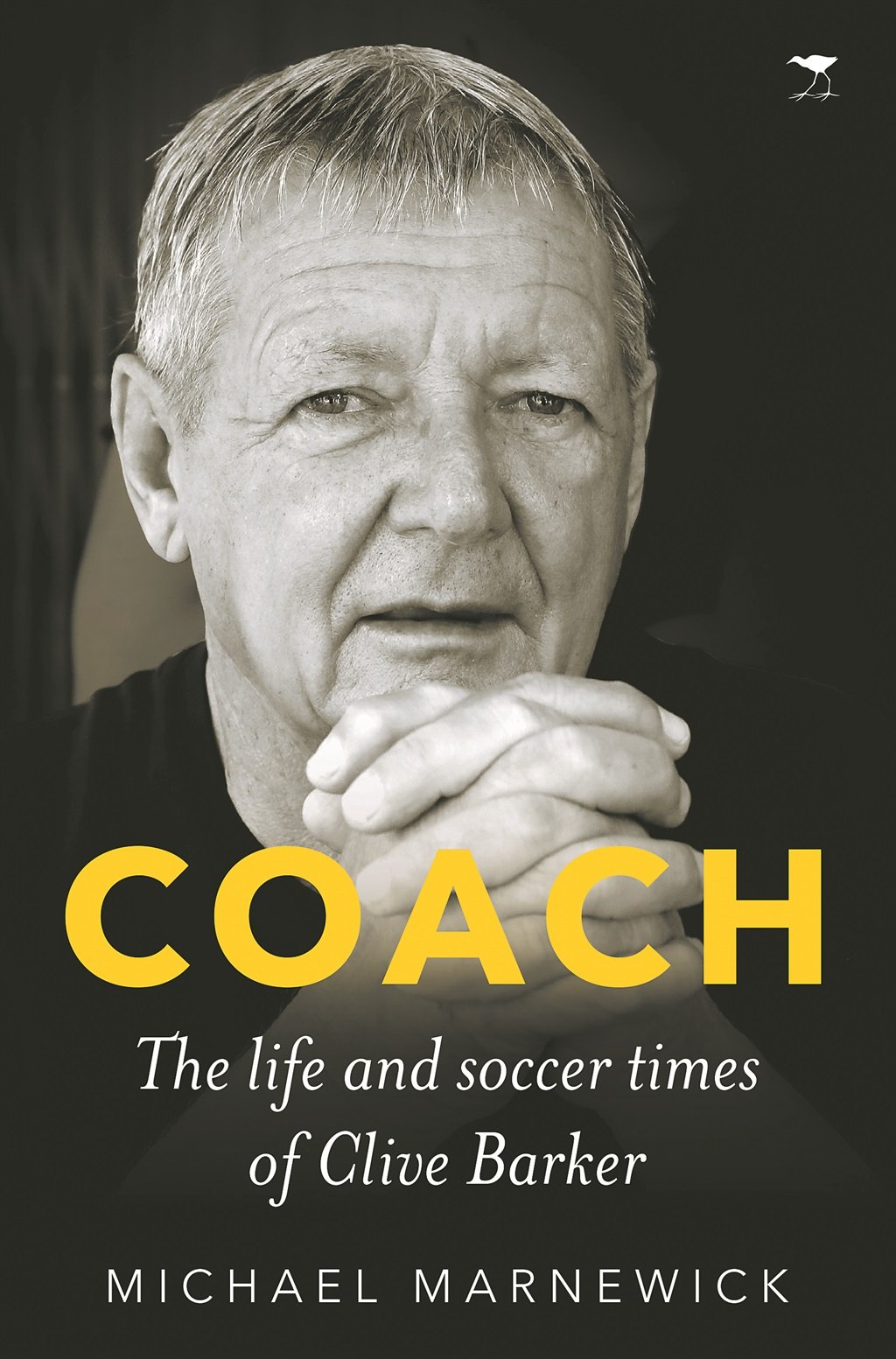
Coach: The life and soccer times of Clive Barker is an insightful biography that will be launched in Johannesburg on Thursday. Author Michael Marnewick helps Barker reveal himself in this book. Here he speaks of his early love for football.
Chapter one: Humble beginnings
“Football has been my life, my passion.” – Clive Barker
There hasn’t been a day in nearly 65 years that I haven’t been involved in football or thought about the game in one way or another, be it playing or coaching. It has brought me immense satisfaction, as well as frustration, plenty of grey hair, but also much joy.
I’ve travelled the world, met great people, coached wonderful players and fantastic teams and, in all of this, I feel very privileged to have played some small role in the development of a sport revered by millions. South Africa was badly fractured by apartheid, but, through it all, football played a significant role in unifying the nation when it needed harmony.
Some of my harshest critics believed that, as a white coach in a black-dominated sport, taking me for a foreigner, I would be out of touch and unable to grasp the complexities of South African football. It was probably my greatest frustration with the local press and a view I considered insulting. I was at pains to rectify this whenever the issue was raised. I guess the misperception was born out of the fact that it was unusual for a white South African to be involved, at a coaching level, in what was considered to be a black sport in the 1970s and 1980s.
Even today, people are under that impression, so let me put the doubters to rest that I’m a South African through and through – born on June 19 1944 in Bellair, a suburb of Durban in KwaZulu-Natal.
My dad, Robert Lawrence Barker, played in the midfield for the local football team – Hillary Football Club – and boxed at an amateur level, going on to represent Natal. He could also play the banjo and, together with my mother’s skill on the piano, many a fine tune would be played on a Saturday night. I don’t think it’s any surprise or coincidence that football, boxing and music have played their part in my life.
Title: The life and soccer times of Clive Barker
Publishers: Jacana Media
Size: 286 pages
Recomended Price: R240
Genre: Biography/Memoir
ISBN: 978-1-4314-2673-7
Available at all good bookstores
My mother, Patricia Amelia Mary, was a dance instructor with a studio at the Sea View MOTH Hall in Bellair and when Princess Elizabeth and Princess Margaret came out to South Africa with their parents, King George VI and Queen Elizabeth, in 1947, my mom danced for them at a tea party – Mom’s claim to fame.
Recently, I visited a local church near my home in Glenwood, and waited until after the service to chat with the organ player, thanking him for playing so beautifully. His enthusiasm had everyone singing as if they had been accompanied by an orchestra. During our conversation, he asked if I was the football man, and I told him I was. He said that he wanted to share something with me: “I watched your mother dance to a song called Sleepy Lagoon, and I’ll never forget how beautifully she moved.”
It was marvellous that this stranger was able to remember Mom dance more than 70 years ago; it filled me with immense pride.
My sister Penny was a laatlammetjie, but the idol of our family, and my wife Yvonne had a huge influence in bringing her up. Together, my brothers Lawrie and Arthur and I would spend every afternoon in the garden kicking the ball around until the radio programme Superman would come on and we’d forgo our heroics for those of our superhero.
Sadly, my mom and dad both died at the tender age of 46; how I wish we could have this time again.
My recollection of growing up in Bellair is filled with happy memories … I attended a wonderful school, Bellair Primary, and was given every opportunity to succeed. Bellair Primary was very small – I recall there being about 10 pupils in my class, but, realistically, there were probably more than that. When you’re little, the world is a big place, but your immediate surroundings seem much smaller. This was a football-playing school; the deputy principal, Mr McMillan, was fanatical about the sport and I needed little encouragement to participate. Bellair Primary provided me with a fabulous upbringing and I’m happy to report that the school is still in existence today.
I recall one particular teacher, Mrs Hesom, writing in one of my reports: “A charming manner won’t get you through life – you’ll have to go out and work a lot harder.”
This was my first lesson in life.
Because my mother was a dance teacher, we would put together a show each year to collect money for the MOTHs in Sea View and Bellair. It was a tradition for me to get up on stage and open the concert singing There’s no Business like Show Business and copy the likes of Frank Sinatra.
But my performing days lasted only as long as I was the cute kid singing on stage. Football took over in a big way and the sport consumed me completely. Every present I received would be related to football.
Every Friday night, I would clean my boots until they were spotless and then wash the laces, and on Saturday morning my mates and I would catch a train to Central Station in Durban. We would make our way to the football field and the Under-11s would start the day’s action. It was a big thing to represent your school against the other local schools.
We would finish the game breathless but excited, hoping that someone wouldn’t turn up for the Under-13 match that followed. That way, if you were good enough, the coaches might ask you to come play again; the likelihood of playing two matches in the morning was pretty high. Later, the first team would play in the league from which the Natal team was eventually selected.
My high school days were spent at Glenwood Boys’ High, which was not a soccer school – not at all – and it was a tough time for me. In fact, because of the pressure they had put on him to play rugby instead of football, my brother left Glenwood, knowing the school’s sporting priorities – that rugby was for white people and football for the black population – would limit his sporting opportunities. He slipped out for Natal Schools’ trials and was caught. Eventually, my father removed Arthur and sent him to school in Queensburgh. I think the really negative sentiment towards football was because they were protecting rugby.
I was able to keep up my footballing by playing for the Berea Park Under-14 to Under-16 teams, but, just as I was about to start playing professionally, the school informed me in no uncertain terms that I would be playing rugby. Norman Elliott and John Watkins from Durban City went to see Mr JB Colam, the Glenwood principal, to try to coax him into allowing me to stick with football, but without success.
Thus began a shining career in rugby that lasted all of 80 minutes. My first match was against St Henry’s and my less than superb performance must have convinced them that my future lay with a round rather than an oval ball. I’m happy to report that I was subsequently released from rugby duty to play football for Durban City.
My academic record at high school probably mirrors my prowess on the rugby field. When I was preparing to write exams, I would move in with my grandparents because my granny looked after us so well. It didn’t help me pass, though – I was thicker than two short planks.
In 1960, I signed my first playing contract with Durban City. I was only 16 and, because of my young age and small stature, was nicknamed the Darling of Kingsmead.
It was a daunting experience playing at such a young age in the top league, but I was determined to realise my dream of playing at that level – with the hope of one day going across to play in England.
My progress was hampered when I damaged my knee playing against Rangers in Johannesburg. I went up for a challenge and came down awkwardly, tearing ligaments in my knee.
* This is Marnewick’s fifth book. He is a lifetime friend of the Barker family




 Publications
Publications
 Partners
Partners








